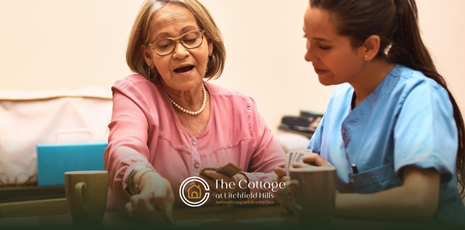Tips for Visiting Seniors in Memory Care

Key Highlights
- Regular visits provide emotional comfort, reduce isolation, and boost well-being.
- Use simple communication, memory triggers, and non-verbal cues to connect effectively.
- Short, frequent visits are often more beneficial than long, exhausting ones.
- Shared activities like music, crafts, and gentle exercise make visits enjoyable and stimulating.
- Flexibility, patience, and coordination with staff help create positive and meaningful experiences.
Visiting a loved one in memory care can be both rewarding and challenging. Seniors living with Alzheimer’s or other forms of dementia may have difficulty communicating, remembering events, or understanding what is happening around them. However, regular visits are crucial for maintaining emotional connections, providing comfort, and improving overall quality of life.
This guide will explore practical tips for visiting seniors in memory care, offering strategies to enhance communication, make visits enjoyable, and support the well-being of your loved one.
Understanding Memory Care
Memory care is a specialized type of senior living designed to support individuals with Alzheimer’s disease, dementia, or other cognitive impairments. Memory care communities provide:
- Safe and secure environments: Preventing wandering and accidents.
- Structured daily routines: Helping residents feel more comfortable and oriented.
- Specialized programming: Activities designed to stimulate memory, cognitive function, and social engagement.
- Trained staff: Professionals experienced in dementia care and communication techniques.
Understanding these aspects helps visitors approach their time with seniors in a positive, empathetic way.
Why Visits Matter
Visiting a loved one in memory care has numerous benefits:
- Emotional connection: Regular visits can provide comfort, reduce feelings of isolation, and foster happiness.
- Mental stimulation: Conversations, activities, and shared experiences help maintain cognitive function.
- Behavioral improvement: Familiar faces and consistent social interaction can reduce anxiety, agitation, and confusion.
- Support for caregivers: Engaging with a loved one can give caregivers peace of mind and a sense of involvement.
Tips for Effective Visits
Visiting a senior with memory challenges requires patience, empathy, and flexibility. Here are essential tips to make visits meaningful:
1. Be Present and Focused
When visiting, give your loved one your full attention. Turn off phones or distractions, and focus on engaging with them. Eye contact, gentle touch, and a warm smile can communicate comfort and care.
2. Keep Conversations Simple
Seniors with memory loss may struggle to follow complex conversations. Use simple sentences, speak slowly, and give them time to respond. Avoid correcting or arguing over facts—they may remember things differently.
3. Use Memory Triggers
Photos, familiar objects, music, or scents can help spark memories. For example, looking through old family albums or playing music from their past can evoke positive emotions and conversation.
4. Plan Short, Frequent Visits
Rather than long visits that may cause fatigue or frustration, consider shorter, more frequent visits. This helps seniors remain engaged without feeling overwhelmed.
5. Engage in Activities Together
Shared activities are excellent for connection and stimulation. Ideas include:
- Listening to music or singing familiar songs
- Doing simple crafts or puzzles
- Gardening or tending plants
- Cooking or baking together
- Reading aloud or storytelling
6. Be Flexible and Patient
Memory care residents may have unpredictable moods or behaviors. Some days they may be alert and talkative, while other days they may be withdrawn or confused. Adapt your visit based on their energy and emotional state.
7. Respect Their Environment
Memory care communities have routines designed to provide stability and safety. Coordinate visits with staff to ensure you visit during optimal times and avoid disrupting meals, therapy, or rest periods.
Communication Techniques
Effective communication is key when visiting seniors in memory care. Strategies include:
- Non-verbal cues: Smile, use gentle touch, and maintain eye contact to convey warmth.
- Positive reinforcement: Praise participation in activities, even if outcomes are imperfect.
- Validation: Acknowledge their feelings rather than trying to correct them. For example, if a loved one is anxious about missing an event, empathize: “I understand this feels upsetting.”
- Redirection: If a topic causes agitation, gently steer the conversation toward calming or familiar subjects.
Common Challenges and How to Handle Them
| Challenge | How to Handle | Tips |
|---|---|---|
| Repetition | Seniors may repeat questions or stories | Respond calmly and consistently, and redirect to a new activity |
| Confusion | Difficulty recognizing people or events | Introduce yourself gently and remind them of shared experiences |
| Agitation or aggression | May occur during frustration or overstimulation | Speak softly, avoid confrontation, and redirect focus |
| Withdrawal | Some seniors may not engage | Offer favorite activities, gentle encouragement, or simply sit together quietly |
| Emotional ups and downs | Mood swings are common | Be patient, empathetic, and maintain a calm presence |
Activities That Strengthen Connections
Engaging seniors in meaningful activities enhances visits and promotes cognitive and emotional well-being:
- Music therapy: Singing familiar songs can trigger memories and improve mood.
- Art projects: Painting, coloring, or crafting provides self-expression and enjoyment.
- Sensory activities: Gentle hand massages, soft fabrics, or aromatherapy can be calming.
- Exercise: Short walks, chair exercises, or stretching help maintain mobility.
- Memory games: Simple puzzles, matching games, or storytelling encourage cognitive stimulation.
Preparing for Visits
Preparation is crucial for a successful visit:
- Check their schedule: Coordinate with staff to avoid conflicting therapy or nap times.
- Bring items from home: Photos, favorite snacks, or personal items can provide comfort.
- Set realistic expectations: Accept that memory care residents may not remember all details or respond consistently.
- Maintain your own patience: Emotional preparedness helps you handle challenges calmly.
Supporting Long-Term Well-Being
Frequent, positive visits can significantly impact a senior’s long-term well-being. Consistent social interaction reduces isolation, reinforces emotional stability, and maintains cognitive function. Family members and friends play a vital role in enriching the lives of residents in memory care.
Additionally, caregivers and staff benefit from knowing that loved ones are actively engaged in their care, creating a supportive, connected environment.
Final Thoughts
Visiting a senior in memory care can be deeply rewarding when approached with empathy, patience, and thoughtful strategies. By focusing on meaningful interactions, engaging in familiar activities, and respecting their environment, visitors can foster emotional well-being, cognitive stimulation, and stronger connections.
Communities like The Cottage at Litchfield Hills provide structured routines, safe environments, and specialized programming that make visits more enjoyable and effective, ensuring that seniors receive the care, engagement, and connection they deserve. Reach out today!
Frequently Asked Questions
How often should I visit a loved one in memory care?
Short, frequent visits are generally more effective than occasional long visits. Aim for multiple visits per week if possible.
What if my loved one doesn’t recognize me?
Focus on creating positive experiences through touch, tone of voice, and shared activities rather than insisting on recognition.
Can I bring food or gifts?
Yes, but check with staff for dietary restrictions or community policies. Familiar items from home can provide comfort.
How do I handle agitation or frustration during visits?
Stay calm, speak softly, validate feelings, and redirect to calming activities. Avoid arguing or forcing recognition.
Are group visits or family activities helpful?
Yes. Engaging in group activities or multi-family visits can enhance social interaction, though it’s important to consider the senior’s comfort level.
Sources:
- https://www.healthdirect.gov.au/cognitive-impairment
- https://pmc.ncbi.nlm.nih.gov/articles/PMC8469939/
- https://pmc.ncbi.nlm.nih.gov/articles/PMC3038531/
- https://www.alzheimers.org.uk/get-support/help-dementia-care/understanding-supporting-person-dementia-psychological-emotional-impact






